
Irfan Javed’s new book of personality sketches charts the lives and anecdotes of eminent writers and poets

Muhammad Hussain Azad is the foremost prose writer of Urdu. His book Aab-e-Hayat (The Elixir of Life) charts the lives and anecdotes of Urdu classical writers, mostly poets. The stories of these writers became so famous that some writers are better known by their stories instead of their couplets. Then there developed a genre of ‘khaka’, or sketch, in Urdu where a writer would reminisce about a certain personality. Irfan Javed has dealt with this genre rather differently, first in his book Darwazay and then in his latest book Surkhaab. He capitalises not only on his own reminiscences but also those of the people close to the person he chooses to portray.
Javed has a unique flair for exploring the cartography of a writer’s mind. He can spend hours on end with literary luminaries and has a keen eye for observing their eccentricities. He may be telling a joke, but even that will open a window into a brand new angle of the writer’s personality. And what a gallery of writers he has chosen! A total of 12 portraits are there in his recent book Surkhaab, including such distinguished personages as Saadat Hasan Manto, Jaun Elia, Ustad Daman and Parveen Shakir.
As opposed to his first book, some of the people portrayed here are those with whom Javed was not very familiar personally, but he compensates for it by doing extensive research and hence presents to us facts which were scattered in a plethora of books and journals. I would like to mention here his account of Manto which may not be as intimate and first-hand as the ones written on him by Ahmed Nadeem Qasmi, Muzaffar Ali Syed and Upendranath Ashk; but Javed has pieced together some very interesting facts about the iconoclast, dispersed in hundreds of pages written after his death. For example, it is for the first time that I have read that Manto had once tried to commit suicide by eating a certain potion made of opium. Javed must have sifted through a huge material of writings about Manto to piece together a short but humane and impassioned portrait.
In an era when Manto has been rediscovered as a cultural icon and when film producers are making movies on his life (and committing some basic biographical mistakes on their way), Javed’s sketch sums up Manto’s tumultuous life quite well. Javed’s essay may well be a starting point for any future film maker who decides to try his hand on Manto.
Khalid Hasan was a prolific writer and translator who was famous for penning beautiful and matchless sketches of Zulfikar Ali Bhutto, Madam Noor Jahan and the city of Sialkot. When Javed was posted to Sialkot for his official duties, he loved the places mentioned by Khalid Hasan all the more and, in due course, wrote an excellent sketch of Hasan in Sialkot’s setting.
Some of the portraits are of writers who are still alive or are Javed’s contemporary. Javed did face certain problems portraying their love lives, as it involved people who are still alive and they might have objected. This is why Javed’s portraiture of Parveen Shakir lacks in some important areas of her life, about which there is enough to gossip in literary circles, but which will certainly need a more scholarly approach by some future researcher. In Jaun Elia’s profile, he was able to throw light on some of the love affairs of the coveted poet, which were not very well-known. Jaun Elia’s fans would definitely feast on these details.
For Muhammad Mansha Yaad’s sketch, Javed has banked heavily on a book by Aslam Sirajuddin, who was a unique fiction writer in his own right. Yaad was a first-rate short story writer who kept his fiction safe from the absurd writings that were rife in his times. His stories brim with life and folk wisdom. Javed’s portrait presents a good starting point for remembering Yaad again.
There are two writers whom I sort of rediscovered after reading Javed’s sketches: Muhammad Ilyas, the fiction writer and Iftikhar Bukhari, the poet. Javed’s essays are a kind of revaluation of their works, and kindle a desire to immediately lay hands on it. Bukhari’s collection of poems was particularly remarkable in its pathos and its use of genuine imagery.
The sketches are not just an introduction to various people but also a critical appreciation of their works. He tries to understand the work through the spectrum of the personality he knows well and, more often than not, he is able to find a new opening through which a new world is revealed to us. This is a unique trait for which a reader feels indebted to him.
Dr Aftab Ahmed and Muzaffar Ali Syed’s sketches were prominent because of the psychological insight they provided about them. Irfan Javed’s portraits will remain essential because of his amalgamation of the two genres of pen-sketch and literary criticism. His fluent style and readability are added benefits which will help new readers as well as old.
Documenting the lives of important personalities of an era is an important job. Plutarch documented the lives of famous Romans, Giorgio Vasari wrote about the Renaissance Italian artists, Lytton Strachey wrote about the "Eminent Victorians", and Azad wrote about Urdu classical poets. Irfan Javed’s sketches will fare well for the present as well as future readers. His book may well be an "elixir of life" for these writers as they will live on in these pages with all their whims and idiosyncrasies.
Surkhaab Author: Irfan Javed
Publisher: Sang-e-Meel Publishers, Lahore
Pages: 248
Price: Rs.900